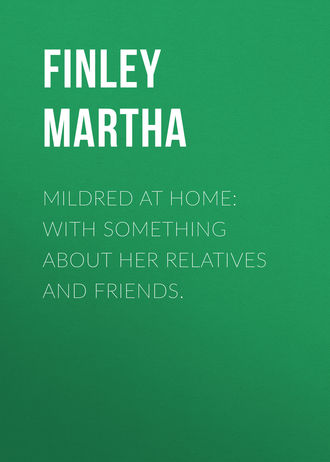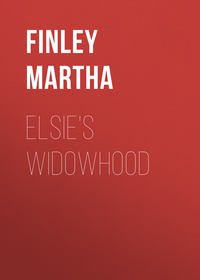 полная версия
полная версияMildred at Home: With Something About Her Relatives and Friends.
Mr. Dinsmore rang for a servant, and sent a message to Zeke. He was directed to make himself clean and decent, and come to the veranda for further orders.
He obeyed. Elsie found him waiting there, and taking him to her garden explained minutely what she wished him to do, calling his attention particularly to the difference between the leaves of the weeds that were to be uprooted and those of some annuals not yet in bloom.
He promised faithfully to attend to her directions and to be industrious.
"Don't you think it's nicer, easier work than what you would have had to do in the field?" she asked.
"Ya-as, Miss Elsie," he drawled, "but it's stoopin' all de same, and I'se got de misery in de back."
She gave him a searching look, then said reproachfully, "O Zeke, you don't look the least bit sick, and I can't help being afraid you are really lazy. Remember God knows all about it, and is very much displeased with you, if you are not speaking the truth."
"Sho I'se gwine to wuk anyhow, honey," he answered, with a sound between a sigh and a groan, as he bent down and pulled up a weed.
"That's right," she said pleasantly, as she turned and left him.
An hour later, coming out to see what progress he was making, she found nearly all her beloved annuals plucked up by the roots, and lying withering among the weeds in the scorching sun.
"Oh, how could you, Zeke!" she cried, her eyes filling with tears.
"Why, what's de mattah, Miss Elsie?" he asked, gaping at her in open-mouthed wonder, not unmixed with apprehension and dismay.
"Matter? You have been pulling up flowers as well as weeds. That is one you have in your fingers now."
Zeke dropped it as if it had been a hot coal, and stood staring at it where it lay wilting on the hot ground. "Sho, Miss Elsie, I didn't go fo' to do no sech t'ing," he said plaintively; "t'ought I was doin' 'bout right. Shall I plant 'em agin?"
"No; they wouldn't grow," she said.
"Dis niggah's mighty sorry, Miss Elsie. You ain't gwine to hab him sent back to de wuk in de field, is you?" he asked, with humble entreaty.
"I'm afraid that is all you are fit for, Zeke; but the decision rests with papa. I will go and speak to him about it. Don't try to do any more work here, lest you do more mischief," she said, turning toward the house.
He hurried after her. "Please now, Miss Elsie, don' go for to 'suade massa agin dis po' niggah."
"No, I shall not," she answered kindly; "perhaps there is something else you can be set at about the house or grounds. But, Zeke," turning to him and speaking very earnestly, "you will never succeed at anything unless you strive against your natural laziness, and try to do your best. That is what God bids us all do. He says, 'Whatsoever thy hand findeth to do, do it with thy might.' 'Whatsoever ye do, do it heartily, as to the Lord and not unto men.'"
"S'pect dat's so, Miss Elsie," he drawled; "but de Lawd He ain't gwine to take no notice what a po' niggah's 'bout in de field or de garden."
"That's a great mistake, Zeke," she said. "His eye is always on you – on everybody; and He is pleased with us if He sees us trying to do faithfully the work He has given us, no matter how low the task may seem to us or other human creatures, and displeased if we are not trying to do it 'as to the Lord and not unto men.'"
"You ain't 'fended 'bout dose po' flowahs what dis po' niggah bin pull up in a mistake, is you now, Miss Elsie?" he asked.
Evidently her religious teachings had made no more impression than the idle whistling of the wind.
"No, Zeke, I only can't trust you again," she said, turning away with a slight sigh over her failure to win him from his inborn indolence.
She hastened to her father with the story of what had occurred.
"Ah! it is about what I had expected," he said. "I am sorry for your loss, but it can soon be repaired. Have you left Zeke there to finish the work of destruction?"
"No, sir; I told him to stop till he heard from you."
"He shall go back to the field at once; there is no propriety in giving him an opportunity to do further mischief," Mr. Dinsmore said, with a decision that left no room for remonstrance; and summoning a servant sent the order.
Elsie heard it with a sigh. "What now? You are not wasting pity on that incorrigibly lazy wretch?" her father asked, drawing her caressingly to his knee.
"I did hope to do him some good, papa," she sighed, "and I'm disappointed that I can't."
"There may be other opportunities in the future," he said. "And do not fret about the flowers. You are welcome to claim all in my gardens and conservatories."
"How good and generous you always are to me, you dear father!" she said, thanking him with a hug and kiss, while her face grew bright with love and happiness. "No, I won't fret; how wicked it would be for one who has so many blessings! But, papa, I can't help feeling sorry for the little tender plants, plucked up so rudely by the roots and left to perish in the broiling sun. They were live things, and it seems as if they must have felt it all, and suffered almost as an insect or an animal would."
Her father smiled, and smoothed her hair with softly caressing hand. "My little girl has a very tender heart, and is full of loving sympathy for all living things," he said. "Ah, Travilla. Glad to see you!" as at that instant that gentleman galloped up and dismounted.
"So am I, sir," Elsie said, leaving her father's knee to run with outstretched hand to meet and welcome their guest.
He clasped the little hand in his, and held it for a moment, while he bent down and kissed the sweet lips of its owner. "What news?" Mr. Dinsmore asked, when he had given his friend a seat and resumed his own.
"None that I know of, except that I have come to your view (which is my mother's also) of the subject we were discussing yesterday, and have decided to act accordingly," Mr. Travilla answered, with a rarely sweet smile directed to little Elsie.
"Oh!" she cried, her face growing radiant, "I am so glad, so very glad!"
"And I, too," said her father. "I am sure you will never regret having come out boldly on the Lord's side."
"No; my only regret will be that I delayed so long enrolling myself among His professed followers. I now feel an ardent desire to be known and recognized as His servant, and am ready to go forward, trusting implicitly His many great and precious promises to help me all my journey through."
"'Being confident of this very thing, that He which hath begun a good work in you will perform it until the day of Jesus Christ'?" quoted Mr. Dinsmore inquiringly.
"Yes," said Mr. Travilla, "for He is able to keep that which I have committed unto Him; able to keep even me from falling."
Chapter Third.
AUNT WEALTHY
Dr. Landreth and his party reached Philadelphia in due season, arriving in health and safety, having met with no accident or loss by the way.
Mrs. Dinsmore found her father and the family carriage waiting for her and her baby boy at the depot.
The others took a hack and drove to the Girard House, where Miss Stanhope, who had been visiting friends in the neighborhood of the city, had appointed to meet them, that they and she might journey westward in company. She was there waiting for them in a private parlor.
The meeting was a joyful one to the two ladies, who, though always warmly attached, had now been separated for a number of years. They clasped each other in a long, tender embrace; then Mildred introduced her husband, and exhibited her baby with much pride and delight; Annis, too, for she had quite grown out of Aunt Wealthy's recollection, and had scarce any remembrance of the old lady, except from hearing her spoken of by the other members of the family.
The travellers were weary with their journey, and there was much to hear and tell; so the remainder of that day was given up to rest and talk, a part of the latter being on the arrangement of their plans. Mildred proposed that they should take a week or more for rest and shopping, then turn their faces homeward.
"You must allow some time for sight-seeing, my dear," said her husband. "It would be a great shame to carry Annis all the way out to Indiana again without having shown her the lions of Philadelphia."
"Oh, certainly she must see them," said Mildred. "You can show them to her while Aunt Wealthy and I are shopping."
"You intend, then, to shut me out of that business? How shall I know that you will not be ruining me?"
"My dear," said Mildred, laughing, "you forget how rich you have made me. I shall have no occasion to ruin anybody but myself."
"And as for me," remarked Miss Stanhope drily, "I have my own purse."
"And father has sent money to buy Ada's things, mother's, and Fan's, too," added Annis. "But, Milly, I must have some share in the shopping, too. I expect to enjoy that as much as the sight-seeing."
Mildred assured her she should have as much as she wanted, adding, "But there will be a good deal which will not be likely to interest you – napery and other housekeeping goods, for instance."
"Your share of those things will interest me, and must be paid for from my purse," put in the doctor.
"Quite a mistake," said Miss Stanhope; "those are the very things a bride or her parents are expected to supply."
"But Mildred is no longer a bride. Milly, my dear, I want you to help me to select a dress for the bride that is to be."
Mildred looked up with a pleased smile. "Just like you, Charlie; always thoughtful and generous!"
Ada Keith was the coming bride. She and Frank Osborne had been engaged for some weeks, and expected to marry in the fall. This news had increased Annis's desire to get home. She wanted, she said, to see how Mr. Osborne and Ada acted, and whether they looked very happy.
"And just to think," she added, "when they're married Fan will be Miss Keith, and we two will be the young ladies of the family."
"Ah, indeed! How old may you be, my little maid?" laughed the doctor.
"Most thirteen," returned the little girl, drawing herself up with an air of importance.
"A very young young lady, most decidedly," he said with a humorous look, bending down to pinch her rosy cheek as he spoke.
"I'm growing older every day," she answered demurely, edging away from him. "Father told me a year ago that I'd soon be a woman."
"Quite soon enough, dear; don't try to hurry matters," said Aunt Wealthy. "You can never be a little girl again."
Mildred, having brought a competent nurse with her thus far on her journey, a colored woman who would serve her in the care of little Percy while they remained in Philadelphia, then return to the South with Mrs. Dinsmore, was able to give herself to the shopping without distraction.
As she had foreseen, the greater part of that work fell to her and Miss Stanhope, Dr. Landreth and Annis accompanying them constantly for a day or two only, after that for an hour or so when something was to be purchased in which they were specially interested.
But the two ladies were equal to the demand upon them; Mildred had had a good deal of experience in shopping in the last few years, and Miss Stanhope was a veteran at the business – an excellent judge of qualities and prices – yet by reason of her absent-mindedness needed to have her knowledge supplemented by the collected wits of her niece.
The old lady's odd ways and speeches often caused no little amusement to all within sight and hearing.
One day she, her two nieces, and Dr. Landreth were in a large, handsomely appointed dry-goods store, looking at silks and other costly dress fabrics.
They had made several selections, and while the doctor and Mildred paid for and saw the goods cut off and put up, Miss Stanhope moved on to the farther end of the room, where she saw, as she thought, an open doorway leading into another of similar dimensions and appearance.
As she attempted to pass through the doorway she found herself confronted by a little old lady rather plainly attired. Miss Stanhope nodded pleasantly, and stepped to the right. At the same instant her vis-à-vis nodded also, and stepped to her left, so that they were still in each other's way. Miss Stanhope moved quickly to the other side, but the stranger doing likewise, they did not succeed in passing. Miss Stanhope stood still, so did the other, and for an instant they gazed steadily into each other's eyes.
Then Miss Stanhope spoke in a gentle, ladylike, yet slightly impatient tone: "I should like to go on into that part of the store, if you will kindly permit me. Take whichever side you will; or, if you please, stand where you are and let me step past you."
She attempted to do so, but again the stranger moved directly in front of her.
"Madam," said Miss Stanhope, unconsciously raising her voice slightly, "I will stand still if you will be good enough to step out of my way."
There was neither reply nor movement, but Miss Stanhope's ear caught sounds of suppressed laughter coming from various directions in her rear, and a clerk, stepping to her side, said, with an unsuccessful attempt to preserve gravity of countenance and steadiness of tone, "Excuse me, madam, but you are standing before a mirror. There is no doorway there."
"Dear me! so I am! What an old simpleton not to recognize my own face!" she exclaimed, joining good-naturedly in the laugh her mistake had raised.
"Very good evidence that you are lacking in the vanity that leads some to a frequent contemplation of their own features," remarked the proprietor politely.
"Ah, sir, an old woman like me has small temptation to that," she returned.
"What was it, Aunt Wealthy? What are you all laughing at?" asked Annis, joining her.
"Just at a foolish mistake of your old auntie's, my dear, taking a mirror for an open doorway, and her own reflection for another woman who wouldn't get out of her way."
Annis could not help laughing a little, though she tried not to, lest she should hurt the dear old lady's feelings.
"I'm not much surprised, auntie," she said, gazing into the mirror, "for it does seem like looking into another store. I think I might have made that mistake myself; but I never could have taken you for anybody else, and it's odd you didn't know yourself."
"Ah, dearie, self-knowledge is said to be the most rare and difficult thing in the world," returned Miss Stanhope pleasantly. "But come, I see the doctor and Milly are waiting for us."
"We are going to some trimming stores now, Aunt Wealthy," said Mildred, "and you will be able to match your zephyrs, I hope."
"Yes; I'll have my samples out ready to show," the old lady answered, taking them from a small satchel which she carried upon her arm. "You and the doctor walk on. Annis and I will follow. Take tight hold of my arm, dearie," she added, holding it out as they stepped into the street, "lest you should get separated from me and lost in the crowd – the streets are so full, and everybody seems in the greatest hurry."
"Yes," said Annis, doing as she was bidden, "so different from Pleasant Plains; there one can hurry along or not as one likes without being jostled. There! Milly and Brother Charlie have gone into a store, and we must follow."
They hastened in, almost out of breath from their rapid walk. Miss Stanhope gently shook off Annis's hand, stepped to a counter, holding out her samples of zephyr, and addressing a clerk, remarked, "These are lovely colors!"
"Yes," said the girl, staring; "but what of it, ma'am?"
"My aunt wishes to match them," said Annis with dignity, resenting the half-insolent tone of the girl.
"Oh! go to the next counter."
They moved on, Miss Stanhope smiling to herself at her own mistake, Annis with cheeks burning with indignation at the girl's rude stare and supercilious tone.
"Don't forget what you want this time, auntie," she whispered, as they paused before the next counter.
"No, dearie, but you mustn't mind your old auntie's blunders."
This time they were waited upon by a sweet-faced, modest maiden, who showed herself both obliging and respectful.
Miss Stanhope found just what she wanted. But Mildred was not ready to go yet, and while waiting for her the old lady and the little girl amused themselves in examining the various contents of a showcase. Annis admired a necklace of amber beads, and Aunt Wealthy bought it for her; also another nearly like it for Fan.
"Anything else, ma' am?" asked the saleswoman, as she wrapped them up.
"Yes; one of those little purses," said Miss Stanhope; "it is just what I want for small change and the trunk of my key, which I always carry in my pocket when travelling."
With a slight smile the saleswoman handed out several.
Miss Stanhope made her selection, and the query, "Anything else?" was repeated.
"Oh, yes!" exclaimed the old lady, as with sudden recollection; "have you any remnants?"
"Remnants? of what?"
"Dress goods."
"Oh, no; we keep nothing but trimmings and notions."
Mildred had finished her purchases, and coming up at that moment, asked, "What is it, Aunt Wealthy?"
"Remnants."
"Oh, yes; of course you will want a supply of them," returned Mildred, with a good-humored, slightly amused smile; "and yet what use can you make of them now? Even Annis has grown too large for a remnant to make her a dress."
"But there's Percy, and Zillah's boy, too," was the prompt reply; "besides, they can be put to many uses about a house."
"Mightn't a remnant be big enough to make an apron for a lady even?" asked Annis.
"Yes," said Mildred; "and as I know auntie enjoys buying them, we will look for some."
They started at once on the quest, and Miss Stanhope was quite elated and triumphant on finding, in two different stores, two remnants of beautiful lawn, exactly alike, which together would make an ample dress pattern for Annis, besides others that could be utilized for aprons for her and Fan, dresses for the baby boys, or patchwork for quilts. Remnants were quite a hobby with the old lady, and she could never feel quite satisfied with the results of a shopping expedition that did not include some bargains in that line.
Returning to their hotel they found letters from the Oaks and from home awaiting them.
"Ah, Milly," remarked the doctor, with satisfaction, as he glanced over his, "here are our measures. Rupert sends them."
"Then they are sure to be right," she responded.
"Measures for what?" inquired Miss Stanhope.
"Wall paper and carpets for our new house; it is ready for them."
"Oh, how nice!" cried Annis, clapping her hands. "May I go with you to choose them, Brother Charlie?"
"We will be pleased to have your company and the benefit of your taste," was the gallant rejoinder, "Aunt Wealthy's also."
"Thank you," said Miss Stanhope, absently. "I'm glad you're so near being done with your house, and I think it's a good plan to buy your paper here; but I'm afraid you'll have to put it on yourselves; for though I remember there were some painterers in Pleasant Plains when I was there, I don't think there were any papers at all, and everybody's walls were whitewashed, as far as I can recollect."
"But you know that was some years ago, auntie," said Mildred, "and a good many luxuries have been introduced since then, paper-hangers among the rest."
"And the Keith family are so handy that they can easily do such work for themselves, if necessary," laughed Annis. "The boys really did paper our house, and paint it, too. Do you see, Milly," holding up a letter, "this is from Elsie. She says she is having a lovely time all alone with her papa, but misses us ever so much, and hopes we will come back to spend next winter at the Oaks."
"Tell her, when you write, that we are greatly obliged, but the journey is quite too long to take twice a year," returned Mildred gayly.
"And we couldn't spend every winter away from father and mother," added Annis. "Oh, how glad I shall be to get home to them, and Fan, and the rest! How soon can we start?"
"Time's up in another week," answered the doctor, "and I judge, by the rate at which we've been going through the shopping and sight-seeing, that we'll be ready by then."
Chapter Fourth
"Gold! gold! gold!Bright and yellow, hard and cold!"– Hood.A beautiful spring day was drawing to a close as two persons – a young man and a maiden – seated themselves on a fallen tree on the western bank of the St. Joseph River. They had strolled a long distance from home, leaving the noise and bustle of the town far behind. They were a trifle weary with their walk, and it was pleasant to sit here and rest in the cool evening air, sweet with the scent of wildwood flowers, with the grass green about their feet, and no sound to break the stillness save the song of the cricket, the gentle murmur of the breeze in the tree-tops, and the soft ripple of the water flowing swiftly onward, so bright and clear that it reflected, as in a mirror, its own grassy wooded banks and the rich purple, gold, and amber of the sunset clouds, while the pebbly bottom, with fishes great and small darting hither and thither, could be distinctly seen.
For some time the two sat there silently, hand in hand, the girl's eyes gazing steadily down into the water, her companion's fixed upon her face with an expression of ardent admiration and intense, yearning affection. It was a noble countenance, at this moment thoughtful and grave, even to sadness.
"Ada, my love," he said at length, "it is a hard thing I am asking of you. I am ashamed of my selfishness."
"No, no! do not talk so. How could I bear to let you go alone, you who have no one in the wide world but me?" she answered, in a low, tremulous tone, her eyes still upon the water; then suddenly turning toward him, her face flushing with enthusiasm, her eyes shining through tears, "But it is not you that ask it of me, Frank; no, not you, but One who has every right; for has He not redeemed me with His own precious blood? Is He not my Creator, Preserver, and bountiful Benefactor, and have I not given myself to Him, soul and body, in an everlasting covenant? And shall I keep back any part of the price? Oh, no, no! Let me but make sure that it is His voice I hear saying, 'This is the way; walk ye in it,' and I am ready to leave all and follow Him, though it be to the ends of the earth."
"My darling," he said with emotion, tightening his clasp of the hand he held, "you have the right spirit; you view this matter in the right light. Yes, we are His, both of us, and may our only question of duty ever be, 'Lord, what wilt thou have me to do?' But if we see it our duty to go, the sacrifice I make will be as nothing to yours, my sweet girl."
"Yet it will not be small, Frank. To leave forever one's dear native land is no slight thing, especially when it is to live among heathen people – low, cruel, degraded idolators."
"That is true; and yet – oh, is there not joy in the thought of telling the old, old story of Jesus and His love to those who have never heard it, and who, if we do not carry it to them, may never hear it?"
"Yes, yes, indeed! and in the thought that we are literally obeying His command, 'Go ye into all the world and preach the Gospel to every creature.' And how very slight will be our suffering and self-denial compared to His!"
"But, Frank, how shall we determine this question? How know whether we are truly called to this great work? Ah, it does not seem possible that I should ever be deemed worthy of such honor!"
"We will continue to make it a subject of constant, earnest prayer," he said, "asking to be guided to a right decision; also we will open our hearts to your parents, and consult them. If they refuse consent to your going, we will see in that an indication that the Lord's will is not that we should go. Laborers are needed here also, and it may be that He will appoint us our work in this part of His vineyard."
"Yes," she said; "I could never feel it right to go if father and mother should oppose it. Yet I am sure they will not, if they see reason to believe we are called of the Master; for ever since I can remember their most ardent wish for their children has been that they might be entirely devoted to His service."
At that very moment the honored parents of whom she spoke, sitting side by side in the vine-covered porch of their home, resting after the labors of the day, were talking of their children, and rejoicing in the well-founded belief that most, if not all, of them had already given themselves to that blessed service.









